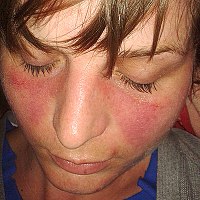
Photo from wikipedia
Cardiovascular disease (CVD) is the leading cause of mortality in the world, with most CVD-related deaths resulting from myocardial infarction or stroke. The main underlying cause of thrombosis and cardiovascular… Click to show full abstract
Cardiovascular disease (CVD) is the leading cause of mortality in the world, with most CVD-related deaths resulting from myocardial infarction or stroke. The main underlying cause of thrombosis and cardiovascular events is atherosclerosis, an inflammatory disease that can remain asymptomatic for long periods. There is an urgent need for therapeutic and diagnostic options in this area. Atherosclerotic plaques contain autoantibodies 1 , 2 , and there is a connection between atherosclerosis and autoimmunity 3 . However, the immunogenic trigger and the effects of the autoantibody response during atherosclerosis are not well understood 3 – 5 . Here we performed high-throughput single-cell analysis of the atherosclerosis-associated antibody repertoire. Antibody gene sequencing of more than 1,700 B cells from atherogenic Ldlr −/− and control mice identified 56 antibodies expressed by in-vivo-expanded clones of B lymphocytes in the context of atherosclerosis. One-third of the expanded antibodies were reactive against atherosclerotic plaques, indicating that various antigens in the lesion can trigger antibody responses. Deep proteomics analysis identified ALDH4A1, a mitochondrial dehydrogenase involved in proline metabolism, as a target antigen of one of these autoantibodies, A12. ALDH4A1 distribution is altered during atherosclerosis, and circulating ALDH4A1 is increased in mice and humans with atherosclerosis, supporting the potential use of ALDH4A1 as a disease biomarker. Infusion of A12 antibodies into Ldlr −/− mice delayed plaque formation and reduced circulating free cholesterol and LDL, suggesting that anti-ALDH4A1 antibodies can protect against atherosclerosis progression and might have therapeutic potential in CVD. An autoantibody found in a mouse model of atherosclerosis recognizses ALDH4A1, and infusion of the antibody delays plaque formation in mice.
Journal Title: Nature
Year Published: 2020
Link to full text (if available)
Share on Social Media: Sign Up to like & get
recommendations!